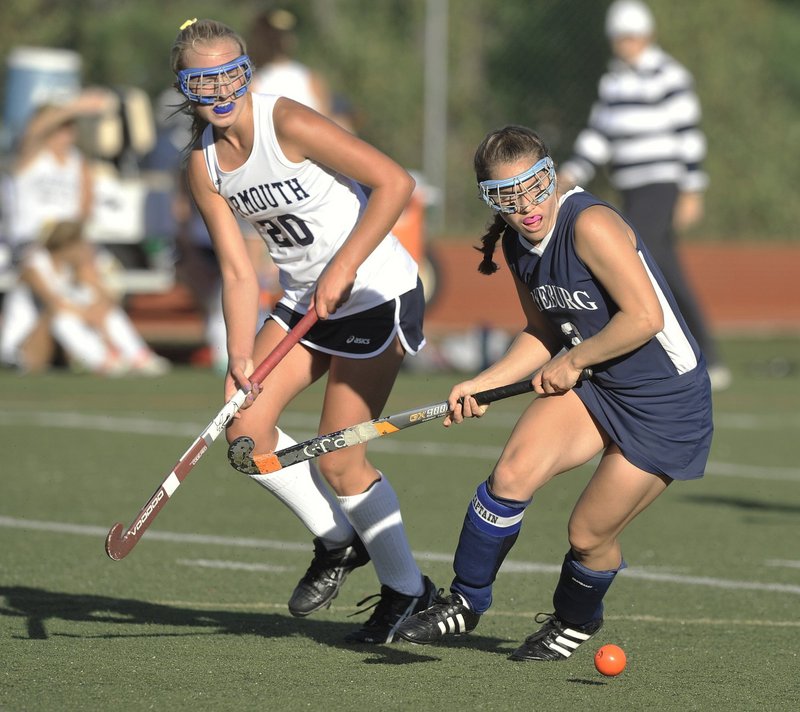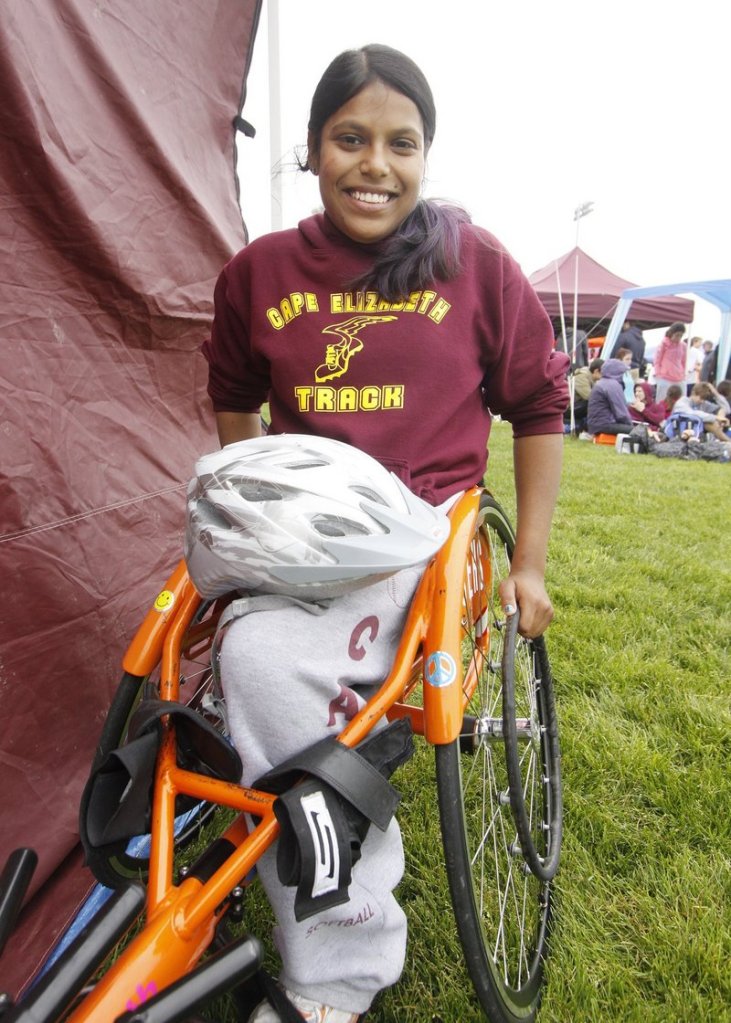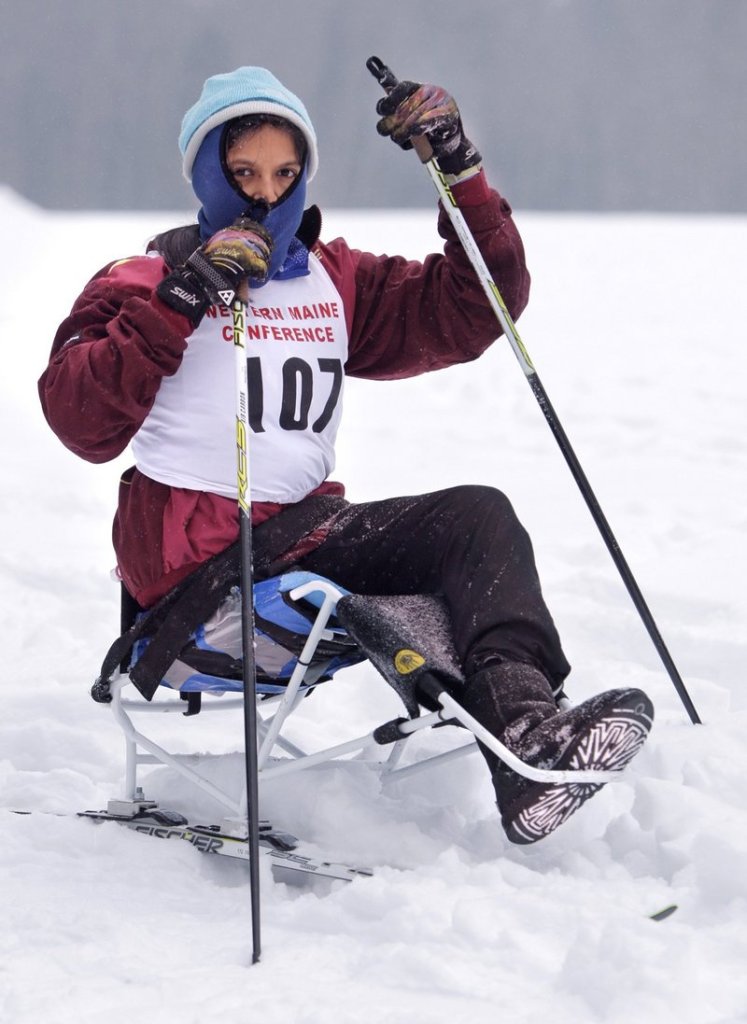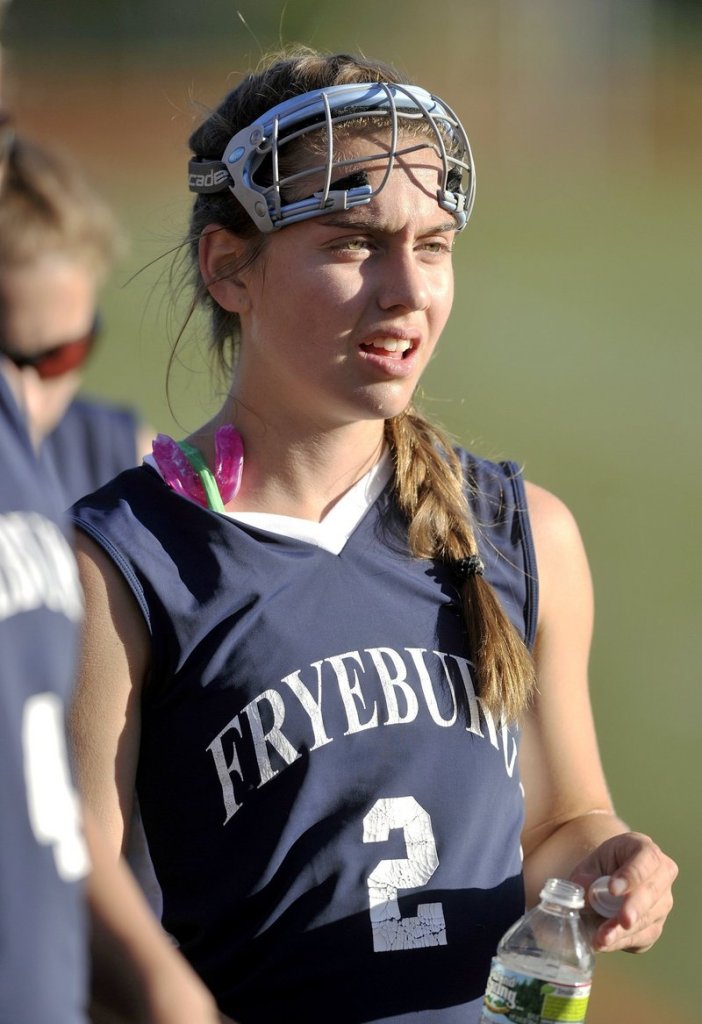At Fryeburg Academy, the field hockey team plays with an orange ball and goals painted orange for a visually impaired player, Christina DiPietro.
At Cape Elizabeth High School, Christina Kouros, who was born with one leg, uses a sit-ski to compete on the school’s Nordic ski team. She also races in her wheelchair in track meets.
Cape Elizabeth’s athletic administrator, Jeff Thoreck, said the school worked with the Maine Principals’ Association to open up track events to disabled students.
“It was amazing how willing and how motivated people were to make this work,” he said. “Maine is very open-minded and very willing to take on change like this.”
The federal Department of Education issued a letter to schools nationwide Friday, saying they must make “reasonable modifications” to allow students with disabilities to play extracurricular sports under existing law.
In Maine, that effort is already happening.
The letter, from Seth Galanter, acting assistant secretary for civil rights in the U.S. Department of Education, is unlikely to set off any big changes in Maine, said Dick Durost, executive director of the Maine Principals’ Association, which coordinates statewide policy for extracurricular activities from sports teams to drama clubs.
“It brings attention to something that I hope we’re already doing,” Durost said Friday. “I’d like to think that most educators, coaches and school systems don’t discriminate against students with disabilities.”
Maine is one of 12 states that have policies for allowing students with disabilities to compete in team sports. In 2011, the principals’ association announced new rules to enable wheelchair athletes to compete in track meets.
To allow disabled athletes to compete, the association announced a different scoring system, additional heats and other changes.
If a school cannot accommodate a student, it is encouraged to partner with a community organization — an adaptive sports program or Special Olympics, for example — to help the student.
Philip Geelhoed, president and chief executive officer of Special Olympics Maine, said his organization has partnerships with 30 Maine schools to form teams with students with and without disabilities to train and compete in a program called Unified Sports.
“Unified Sports is rapidly growing,” Geelhoed said. “We are thrilled to think that many more school officials could now consider adding this to their offerings, in light of this new directive from the Department of Education.”
The letter was prompted by a federal investigation that showed students with disabilities do not always get equal opportunity to play, and directed the Department of Education to clarify the regulations.
Terri Lakowski, a youth sports advocate who led the coalition behind the investigation, said the details in Friday’s letter are critical to taking action at the school level.
Lakowski, who worked on Title IX issues for the Women’s Sports Foundation, compared the fight for students with disabilities to Title IX, the landmark 1972 law that required schools to provide equal sports opportunities to girls and women.
Federal regulations have required schools to accommodate disabled students, but “didn’t explain or define what it meant to have an equal program,” she said.
“It was left to each school, and in some schools that meant full inclusion (for disabled students) while in some instances they were just the water boy or water girl or assistant team manager,” said Lakowski.
The detail in Friday’s letter will change that, she said.
“This is a huge victory,” Lakowski said. “This creates an opportunity for national leadership and uniformity.”
She said Maryland is the only state with legislation requiring equal access to sports teams for students with disabilities. Many states have programs to help such students, but it’s a patchwork.
Georgia, she said, is a model for the nation, with a 10-year-old partnership between schools and an adaptive sports program that has started comprehensive adaptive sports in every season.
The letter encourages public schools to review their sports programs to make sure they’re making every effort to allow students with physical and mental disabilities to participate.
According to the Department of Education, the letter is intended to “clarify” each school’s responsibilities, not establish new rules or regulations.
For example, a school does not have to guarantee a disabled student a spot on a team, just an opportunity to try out and not be discriminated against because of “presumptions and stereotypes,” the letter says.
“Federal civil rights laws require schools to provide equal opportunities, not give anyone an unfair head start. So schools don’t have to change the essential rules of the game, and they don’t have to do anything that would provide a student with a disability an unfair competitive advantage,” U.S. Education Secretary Arne Duncan wrote in a blog post Friday. “But they do need to make reasonable modifications … to ensure that students with disabilities get the very same opportunity to play as everyone else.”
For example, a school might provide a visual cue to a runner who cannot hear a starter’s pistol, or waive the rule of a “two-hand” touch in a swim meet for a one-armed swimmer.
Maine has several high-profile examples of disabled athletes, including DiPietro and Kouros.
DiPietro has been playing on teams since elementary school and is still playing as a high school senior, said her mother, Ann DiPietro.
“It wasn’t a hard process, but it was a lot of work,” said Ann DiPietro, describing meetings with coaches and working with the Maine Principals’ Association to ensure that her daughter had access to sports at school.
Thoreck said Cape Elizabeth teams have other students with disabilities, including a blind swimmer who counts his strokes and competes with no special accommodation.
Being on the team is “important for that student, but it’s also important for the entire student body to have that sensitivity,” Thoreck said. “It’s part of athletics.”
“Maybe this will inspire some kids to get out there,” said Andrea Kouros, Christina’s mother. “Everybody just wants to be part of the team.”
She said the school’s support for her daughter has gone beyond sports. Because Christina needs a special wheelchair for track events, the school’s shop class recently acquired plans for a chair and intends to build one as a project.
Thoreck hopes to distribute those plans to other athletic directors so other schools can make the chairs for athletes who need them.
At Deering High School, 15-year-old Bridget Lally, who has Down syndrome, is on the swim team. Her mother, Angie Lally, a math teacher at Windham High School, said she got Bridget involved in sports at an early age.
“I know the importance of sports and being part of a group, the social part that goes with the exercise, the competition, ” Lally said. “Sports are good for all kids.”
The coaches have been supportive and Bridget couldn’t be happier, her mother said.
“If you ask her, she says she won. That’s how she feels. She did it, so she won,” Lally said.
Her coach, Angie Marcotte, said she has made accommodations for Bridget, such as setting a modified practice and race schedule and putting her only in short freestyle races.
At the meets, Marcotte said, the other team members line the pool and cheer Bridget as she swims.
Marcotte said she welcomed the Department of Education’s letter Friday, although she was already open to any student who wanted to try out for the swim team.
There are several swimmers with learning disabilities on the Deering team. Marcotte writes down the practice drills and repeats instructions to help them train.
“I welcome all the swimmers I can,” she said. “I think that makes the swim team better, having a variety of backgrounds and abilities.”
Staff Writer Noel K. Gallagher can be contacted at 791-6387 or at:
ngallagher@pressherald.com
Send questions/comments to the editors.






